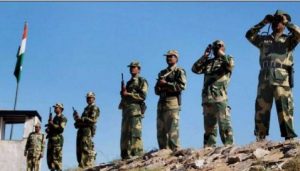Top commanders of the Army will carry out a comprehensive assessment of India’s combat readiness in eastern Ladakh as well as other sensitive areas along the Line of Actual Control with China at a four-day conference beginning today, government sources said. The commanders will also deliberate on a slew of long-pending reform measures like cutting down on ceremonial practices and non-military activities to ensure a rational distribution of resources, they said.
Chief of Army Staff Gen MM Naravane will chair the Army Commanders’ Conference (ACC), which is an apex level biannual event that formulates important policy decisions through a collegiate system of deliberation.

It will be attended by all Army Commanders, Principal Staff Officers (PSOs) of the Army headquarters and other senior officers.
Defence Minister Rajnath Singh, Chief of Defence Staff Gen Bipin Rawat, Chief of Naval Staff Admiral Karambir Singh and Air Chief Marshal RKS Bhadauria will address the commanders on Tuesday, the sources said.
“The Army Commanders will carry out a comprehensive review of the security challenges facing the nation including the situation in eastern Ladakh and Jammu and Kashmir,” said a source.
The situation in eastern Ladakh remains tense as both Indian and Chinese armies deployed over 50,000 troops each along the LAC following escalation of standoff that began in early May.
The sources said the commanders will exclusively deliberate on matters relating to human resource management in the Army on Monday while they will carry out an in-depth discussion on Wednesday on various agenda points highlighted by the top Army Commanders.
There will be a discussion on issues flagged by the Commander-in-Chief of the Andaman and Nicobar Command, which is India’s only tri-services command.
Besides reviewing the security challenges facing the nation, the Army commanders will attempt to finalise various reform measures recommended by separate internal committees in the utilisation of limited resources while at the same time focusing on enhancing the operational capability of the 1.3-million strong force, the sources said.
Some of the proposals to be on the table at the conference include discontinuing or at least bringing down the scale of the Army Day and Territorial Army Day parades, cutting down on various ceremonial practices and reducing the number of officers’ mess within individual peace stations, the sources said.
Similarly, the top Army brass will also examine a proposal to bring down the number of guards at official residences of senior officials and another one on reducing the number of CSD canteens if several such facilities are operating within one station, they said.
Another proposal on the table for discussion would be to asking various units to cut costs on celebrating Raising Day and Battle Honour Day.
The sources said the last day’s agenda of the conference will include a briefing by the Director-General of Border Roads on the various infrastructure development projects being undertaken by the Border Roads Organisation (BRO) and allied formations.
They said “automation initiatives” to optimise utilisation of manpower at various levels of the Army will also be discussed.
“The conference will end with the presentation of sports trophy and flight safety trophy, followed by the closing address by the Chief of Army Staff,” said a source.